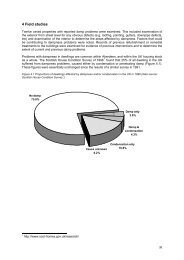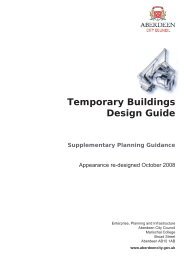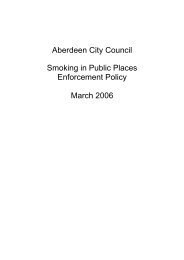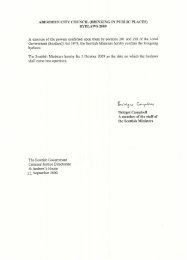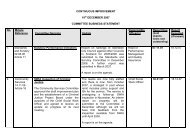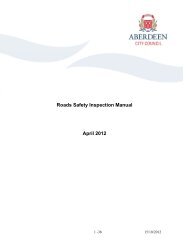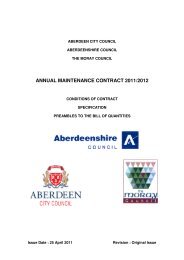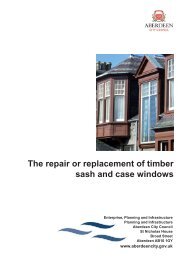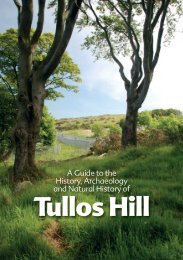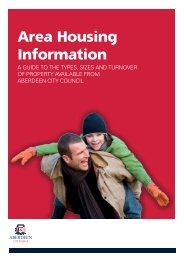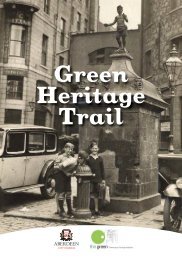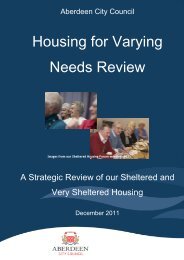he concept of the Burgess oath belongs - Aberdeen City Council
he concept of the Burgess oath belongs - Aberdeen City Council
he concept of the Burgess oath belongs - Aberdeen City Council
- No tags were found...
You also want an ePaper? Increase the reach of your titles
YUMPU automatically turns print PDFs into web optimized ePapers that Google loves.
In 1364 a general charter granting newprivileges throughout Scotland had t<strong>he</strong>effect <strong>of</strong> reinforcing <strong>Aberdeen</strong>’s control<strong>of</strong> exports from <strong>Aberdeen</strong>shire and inrestricting involvement in suchcommerce to t<strong>he</strong> merchants.T<strong>he</strong> Trade <strong>Burgess</strong>es were dealt a furt<strong>he</strong>rblow in 1469 with t<strong>he</strong> introduction <strong>of</strong> anew Act described as t<strong>he</strong> most damningAct <strong>of</strong> t<strong>he</strong> Scottish Parliament whichmade burgh councils self-electing,effectively denying t<strong>he</strong> Trade <strong>Burgess</strong>esany worthwhile say in local affairs.This conflict between <strong>Burgess</strong>es was notconfined to <strong>Aberdeen</strong>. A joint appealfrom trade members in Edinburgh, Perth,Dundee and <strong>Aberdeen</strong> obtained fromKing James VI in 1581 a new charterconfirming old privileges and anextension <strong>of</strong> t<strong>he</strong>ir trading rights.However, <strong>Aberdeen</strong> magistrates andcouncil extorted promises fromprominent traders not to exercise t<strong>he</strong>seprivileges, and, in turn, t<strong>he</strong> traders t<strong>he</strong>nrefused to proceed with t<strong>he</strong>ir part in t<strong>he</strong>election <strong>of</strong> council <strong>of</strong>fice-bearers untilt<strong>he</strong>ir rights were restored.In 1587, with both sides possibly tiring<strong>of</strong> reprisals, t<strong>he</strong>ir differences went toarbitration and a decree was issuedregulating t<strong>he</strong> dealings <strong>of</strong> t<strong>he</strong> Town<strong>Council</strong> with t<strong>he</strong> traders.Besides defining t<strong>he</strong> respective liberties<strong>of</strong> trading for both sides, t<strong>he</strong> decree - t<strong>he</strong>Common Indenture - also fixed entrycharges for new <strong>Burgess</strong>es. But t<strong>he</strong>agreement did not produce t<strong>he</strong> expectedharmony and differences mounted to t<strong>he</strong>point w<strong>he</strong>re, in 1592, an open-airmeeting at Greyfriars became a violentconfrontation at which blood was spilt.This had t<strong>he</strong> effect, however, <strong>of</strong> bringingboth sides to t<strong>he</strong>ir senses and a few dayslater, at a more solemn meeting atWoolmanhill, t<strong>he</strong> parties werereconciled.Gradually, over t<strong>he</strong> years, as t<strong>he</strong> practice<strong>of</strong> granting rights and privileges to<strong>Burgess</strong>es lessened considerably, so toodid division between <strong>Burgess</strong>es <strong>of</strong> Guildand <strong>of</strong> Trade. A new equality began toemerge, first from decisions by t<strong>he</strong>Convention <strong>of</strong> Royal Burghs and laterby t<strong>he</strong> Reform Act <strong>of</strong> 1833 which alsoput council elections on a new footing.Now, with those years <strong>of</strong> division left farbehind, Guild and Trade are united onceagain as <strong>Burgess</strong>es supporting t<strong>he</strong>wellbeing <strong>of</strong> t<strong>he</strong> <strong>City</strong> <strong>of</strong> <strong>Aberdeen</strong>.Early 19th Century advert to sell goods in <strong>Aberdeen</strong>Petition from Town’s tradesmen to t<strong>he</strong> Dean <strong>of</strong>Guild to stop sale



